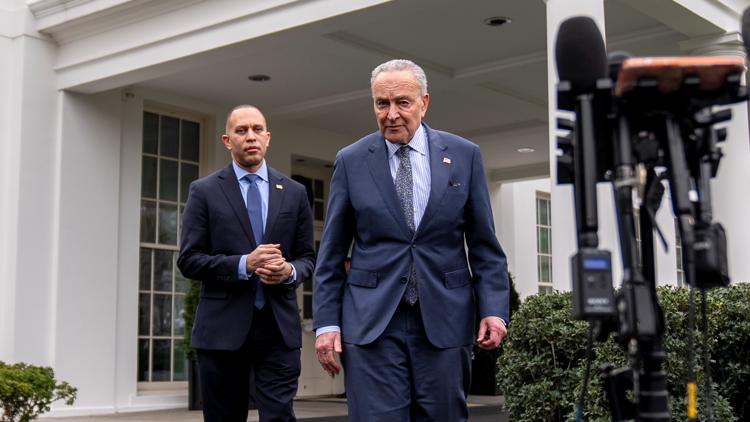Share this @internewscast.com

If a funding bill isn’t passed, the government will run out of operating funds on Oct. 1.
WASHINGTON — Democratic and Republican congressional leaders are heading to the White House on Monday for a meeting with President Donald Trump, in a last-ditch effort to prevent a government shutdown. However, both parties have remained firmly entrenched in their positions, showing little willingness to compromise.
If Congress does not pass government funding legislation and Trump does not sign it by Tuesday night, numerous government offices across the nation will temporarily close, leading to furloughs for non-exempt federal employees. This could exacerbate the strain on both workers and the national economy.
Republicans are challenging Democrats to oppose legislation that would maintain government funding largely at its current levels. So far, Democrats have stood their ground, leveraging one of their limited points of influence to demand that Congress consider legislation extending health care benefits.
“The meeting is a first step, but only a first step. We need a serious negotiation,” Senate Democratic leader Chuck Schumer stated in an interview Sunday on NBC’s “Meet the Press.”
Trump has shown little interest in addressing Democrats’ health care demands, though he agreed to a Monday afternoon meeting with Schumer, Senate Majority Leader John Thune, House Speaker Mike Johnson, and House Democratic leader Hakeem Jeffries. The Republican president has repeatedly asserted that he expects the government to experience a shutdown this week.
“If it has to shut down, it’ll have to shut down,” Trump said Friday. “But they’re the ones that are shutting down government.”
The Trump administration has attempted to pressure Democratic lawmakers into withdrawing their demands, warning that during a funding lapse, federal employees might face permanent layoffs.
“Chuck Schumer said a few months ago that a government shutdown would be chaotic, harmful and painful. He’s right, and that’s why we shouldn’t do it,” Thune, a South Dakota Republican, said Sunday on “Meet the Press.”
Still, Democrats argued that Trump’s agreement to hold a meeting shows that he is feeling the pressure to negotiate. They say that because Republicans control the White House and Congress, Americans will mostly blame them for any shutdown.
But to hold on to their negotiating leverage, Senate Democrats will likely have to vote against a bill to temporarily extend government funding on Tuesday, just hours before a shutdown — an uncomfortable position for a party that has long denounced shutdowns as pointless and destructive.
The bill has already passed the Republican-controlled House and would keep the government funded for seven more weeks while Congress works on annual spending legislation.
Any legislation to fund the government will need support from at least 60 senators. That means that at least eight Democrats would have to vote for the short-term funding bill, because Republican Sen. Rand Paul of Kentucky is expected to vote against it.
During the last potential government shutdown in March, Schumer and nine other Democrats voted to break a filibuster and allow a Republican-led funding bill to advance to a final vote. The New York Democrat faced fierce backlash from many in his own party for that decision, with some even calling for him to step down as Democratic leader.
This time, Schumer appears resolute.
“We’re hearing from the American people that they need help on health care and as for these massive layoffs, guess what? Simple one-sentence answer: They’re doing it anyway,” he said.
Democrats are pushing for an extension to Affordable Care Act tax credits that have subsidized health insurance for millions of people since the COVID-19 pandemic. The credits, which are designed to expand coverage for low- and middle-income people, are set to expire at the end of the year.
Some Republicans are open to extending the tax credits, but want changes. Thune said Sunday that the program is “desperately in need of reform” and Republicans want to address “waste, fraud and abuse.” He has pressed Democrats to vote for the funding bill and take up the debate on tax credits at a later date.
It remains to be seen whether the White House meeting will help or hurt the chances for a resolution. Negotiations between Trump and Democratic congressional leaders have rarely gone well, and Trump has had little contact with the opposing party during his second term.
The most recent negotiation in August between Schumer and the president to speed the pace of Senate confirmation votes for administration officials ended with Trump telling Schumer to “go to hell” in a social media post.
Trump also abruptly canceled a meeting that was planned with congressional leaders last week, calling Democrats’ demands “unserious and ridiculous.”
Schumer argued that the White House coming back to reschedule a meeting for Monday showed that “they felt the heat.”
Copyright 2025 Associated Press. All rights reserved. This material may not be published, broadcast, rewritten, or redistributed.
















